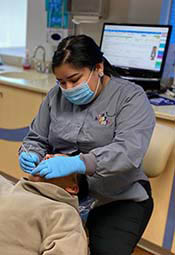Some of the most preventable health problems children face are dental health problems. And yet, roughly one in six children (17.5%) age 5 to 19 years old suffers from untreated cavities and/or tooth decay, according to the CDC.
This is a problem that goes far beyond the bathroom mirror. Untreated tooth decay can cause pain and infections, and these can lead to problems with eating, speaking, and concentrating in school. Children with poor oral health have been found to be three times more likely to miss school as a result of dental pain. And children with missing teeth are much more likely to experience emotional stress — unless steps are taking to counteract the decay and protect their teeth.
The evidence is clear: For children, oral health has an impact on many other aspects of life, for good or bad. So what can you do to ensure that your kids aren’t being left behind?
What Oral Health for Children Looks Like
Again, most dental health problems are easily preventable if you follow the guidelines set by professional dentists:
Understand What Healthy Teeth Look Like and Signs of Trouble
Healthy teeth should be a consistent whitish color. They should not be yellow or gray, nor have white spots, bands, or other discolorations. Gums should look healthy and pink, too.
If your child consistently complains of pain in their mouths or gums, or if their gums appear to be red, swollen, or bleeding, these are all signs that something might be wrong. Take your child to see a dentist and make sure there isn’t something serious going on.
Start Building Good Habits Now
People are much less likely to skip or forget to do something if it has become a habit. So, encourage good oral hygiene habits in your children early on, such as:
- Brushing at least two times a day, after meals
- Flossing regularly
- Using mouthwash with fluoride
- Cutting down on sugary snacks
Protect Your Child’s Teeth with Fluoride
Fluoride is a naturally occurring mineral that has been shown to help prevent tooth decay. In many cities fluoride is already added to drinking water; if your drinking water is not fluoridated, ask your dentist or family doctor whether your child should be taking fluoride supplements.
Most toothpaste also contains fluoride. If the brand you use does not, consider switching. (Fluoride toothpaste should not be used with children under age two. Children under six should be watched to make sure they are using only a small amount and not swallowing it afterward.)
You may also want to talk to your dentist or family doctor about putting a fluoride varnish on your child’s teeth. Research shows that fluoride varnish is highly effective at reducing tooth decay if it is applied regularly — twice a year is recommended.
See a Dentist Regularly
Even if your child has good hygiene habits, it is a good idea to see a professional on a regular basis. A good dentist can spot potential problems and recommend treatments that can easily prevent pain and possibly surgery later on down the road.
In fact, the American Academy of Pediatrics recommends that all children have their first dental checkup by the age of one!
First visit? Learn more about “Common Dental Procedures During Your Dental Visit.”
Visit a North Carolina Location
If you live in North Carolina, you can visit one of our locations whether your child is having a problem, is due for a check-up, or if you simply have some questions. We love new clients!


